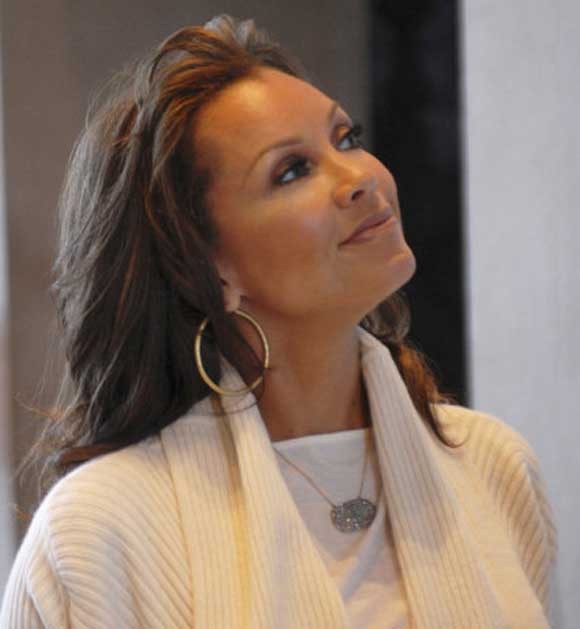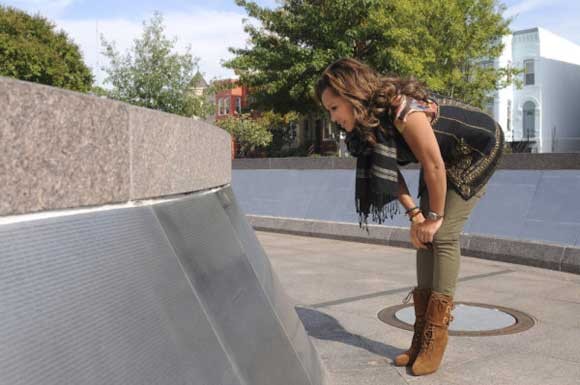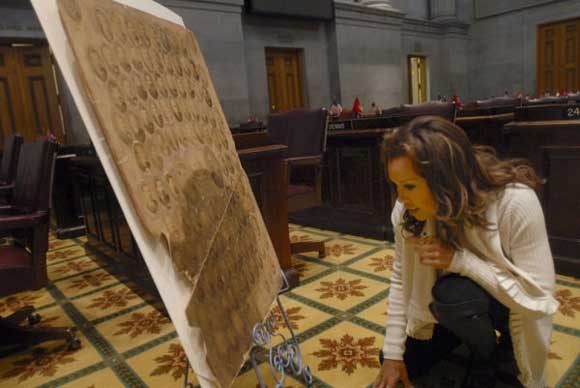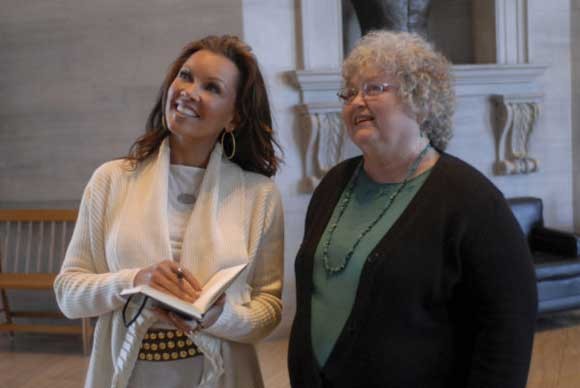
People are becoming more educated and curious about finding out their lineage or roots. As an African American trailblazer, the multi-talented, Vanessa Williams stepped back into time to discovery her past and learned important lessons that have shaped her into to the woman she is today. Williams made history by becoming the first African American to win the Miss America crown, and the first African American woman to star on ABC’s “Desperate Housewives.” Of these accomplishments she is proud, but was more excited to discovery her connection to two real life heroes who have paved the way for her and her children.
In an episode of “Do You Know Who You Are?,” researchers will delve deep into Vanessa Williams past to share her rich history. In our conversation, Williams discussed some of her history lessons, her excitement and the lessons she would like her children and everyone to take from the episode. She also encourages everyone, especially African Americans to start searching for who they really are.
“Who Do You Think You Are?” airs Friday, February 4 at 8pm on NBC
SEASON PREMIERE — MULTI-FACETED PERFORMER VANESSA WILLIAMS EXPLORES THE ROOTS OF HER TRAILBLAZING DESCENDANTS – As someone who has made history on her own, Vanessa Williams (“Desperate Housewives”) sets out on a journey to find out if her ancestors were also trailblazers. Her search leads her to the National Archives in Washington, D.C. and to South Carolina where she finds ancestral ties to the Civil War’s Union Army. She also heads to the South and discovers an ancestor who was an educator in a time when many African-American southerners did not have the opportunity to receive an education.

Vanessa, prior to this, how much did you know about your ancestors? And what have you found out thus far that you’re truly impressed by and are proud of?
Vanessa Williams: I couldn’t wait to find out whether there was anything, whether there was a scandal or a scoundrel or thieves or anything, which they always ask you before you start your journey. I was so anxious to do it as a African-American and growing up here in the states, there are a lot of records that we don’t have going back for years because of slavery, because of economics. And I was really fascinated to see how far back we could go on both sides. And the journey that I went on was extraordinary and very surprising but also really gratifying and I felt so honored.
Before the journey, I had really no defined idea of where my lineage went. I knew a bit about the name, David Carl, because he was buried in the same family plot cemetery that my father was. So I had seen the American flag next to his headstone and I assumed that that was part of a Civil War service, but I had really never delved into the actual story and history. I knew that in terms of my David Carl side, I knew that the hill, Carl’s Hill, where David Carl purchased the property after he got his bounty to serve in the Civil War – we knew that was there for a long time.
William A. Fields was one of those stories that I had no idea about. My great-great-grandfather was from Tennessee. My dad was born there. My grandmother was born there. So we knew that that was our home base. So Oyster Bay was kind of ground zero for what we knew and basically through legend, through family stories. The Memphis side was a complete mystery. We really had no idea. Since my grandfather’s mother died so young, there are a lot of unanswered questions. That whole storyline was a mystery and to find out that not only was he in the same profession that my father was, which was a schoolteacher, but that he ended up being elected to the state legislature in Tennessee, that was – I had no idea. And then the fact that he was one of only 14 and had really been a trailblazer and created history. So that was truly a mystery. And to turn that corner, see the bust, and then to see his name just filled me with so much pride. We talked a bit about William Fields’s Journey to the state capital as a colored representative and the fact that this is a land – this is a time where after the Emancipation it was still dangerous to travel as a freed black man. And not only was he a freed black man, but he was a legislature so – a legislator. When we finished, our last day was at the Fields’s – Mount Airy, which was the Fields’s plantation. And it was kind of illustrated when I was at the state capital when the researcher said, “Well, this is William A. Fields’s handwriting. This is the handwriting of a man who’s clearly educated. How could that be?” So discovering that most likely he was born in that – at Mount Airy. The Fields family that owned the Fields slaves were originally from Virginia — settled in Virginia, came out – after tobacco farming had waned and came out to raise cotton in the Memphis area. And their children all went to Princeton. The men of the family went to Princeton. What we surmise is that the Fields or William A. Fields was probably part of a group of slaves that were educated and that was insistent upon by Mr. Fields who was the head of the family. What we trace is that a lot of the Fields’s descendants after the war did extremely well pretty quickly because they were all master carpenters and also well-educated and they were allowed to set up their own business and fared very well after they were freed and that was extraordinary too. And just a side note that my dad’s passion was to be a teacher, but also he loved woodworking, and he built a lot of things in my house and that was his passion too. So when I heard that they were master carpenters, that also kind of blew me away. So the risk that they both took to do what they ended up doing was really highlighted and really gave me a huge sense of discovery but also pride.

And on the – my David Carl side, you know, to go to the African-America Civil War Memorial in D.C. and to see his name there too, it was two-fold. And I never thought that I would have, you know, such a tremendous double, you know, story to be proud of. So the fact that I had the luxury of researchers, of being able to flesh out both of these stories were phenomenal and they made me extremely proud because these are men that were heroes. They took risks and had an extraordinary legacy that we can still talk about and be very happy for. But the fact when we started to research and discover their heroic deeds, I had no idea that not only what they accomplished was very honorable but the fact that they both could’ve easily been killed for doing what they did. I mean we highlight in the show that as a colored union soldier, if David Carl was captured in the South, he could be enslaved and – not only besides being killed but – in battle, but to be enslaved, which was a tremendous sacrifice.
Being an African-American, you never know what you’re going to find because of both the lack of information that we have due to no records. And that was wonderful being able to put on those white gloves and see the actual documents and handle them and read the names and look at the censuses and try to put pieces of the puzzle together. The lessons that I’d learned from two parents that were teachers made me who I am as a woman and as a mother myself. So to be able to step back in time and go to my – both my great-great-grandfathers and see the contributions that they’d made historically filled me with pride and it reaffirms that I come from strong stock. And it was a tremendous journey and I would love to investigate more.
I heard a lot of black history through my parents. Just because I lived in a predominantly white area didn’t mean that I wasn’t aware of black history.
I’m proud of both the stories that were discovered in this episode, for both my great-grandfathers, to see their names in monuments was phenomenal. I come from wonderful, warm, gentle men who love their wives, love their children, and provide and are strong, valiant men. And it was wonderful to see it actually illustrated on paper during our research. It was a great history lesson. I didn’t want it to stop. I love learning and especially when it’s about your own family, it just – it even seems more important.

What was your family’s reaction to the discovery?
Vanessa Williams: Oh, they were fascinated and I wish that I could’ve taken them along. First, I wanted to be able to take my kids along the entire journey after I finished because it was fascinating and it was a great history lesson, especially for African-American history. We went back all the way to 1972, which was amazing that they – we could actually trace back that far.
I was able to bring back two pictures of both of their great-great-great-grandfathers. That was a real surprise — knowing that we had images of both. I really didn’t think that we’d actually find images and that was truly lucky. And to be at the National Archives in D.C. and to be talking to my researcher, Vani, and to say in her 28 years of doing research she had never come across a Tintype which is where we got the image of my great-great-grandfather, David Carl. We’ve got tremendous amount of research that the researchers have done that we’ve got a huge dossier, so there are literally letters and documents that I have copies of that we certainly didn’t have before. So I’m really lucky. I think I have a wealth of knowledge right now. Being an African-American, there’s a lot of stuff that we don’t have the luxury of records due to slavery and also socioeconomic issues. So I hope that this is a slice of what could be discovered particularly for black people living in the United States and also creating history.

I might actually do the same trip with my kids so they can kind of discover and experience what I did, but they were fascinated and especially because it was about my father who passed away five years ago. He was a huge history buff, so he would’ve been so excited to find out more information about his family. My father was the epitome of a teacher. It was all about education and the fact that we saw it, you know, three generations back was really eerie and extraordinary. And it was such a tribute to see some of the qualities that were described in the court records about William A. Fields and a lot of them reflected my father’s attitude towards living and towards education and it’s all about education and that was phenomenal. And it was nice to kind of do that in tribute to him.
It’s amazing to compare what they had to deal with to what me and my kids have to live with and the luxuries that we’ve been afforded because of the trailblazing that my ancestors had done. And I think it was really illustrated that within my two great-great-grandfathers’ lives, their deeds and their efforts were – could’ve easily resulted in death. And those are the stakes that we don’t really have in my lifetime. So that was an extraordinary comparison that was really highlighted when I took my journey.
I personally had started my own Ancestry.com family tree probably a year and a half before any of this so I was always interested but I didn’t have the luxury of having a team of researchers do the lion’s share of the work, which is that was truly lucky for me.
So I hope it’s a history lesson for people. I hope that it inspires them to ask questions and to kind of start their own research. And if they don’t have the tools, there is plenty of avenues that can help them find out what the mysteries are for their own families.